TAGGED AS: crime drama, Max, streaming, television, TV
In Full Circle, the crime drama from frequent collaborators Ed Solomon and Steven Soderbergh, the sins of the past have returned even for those who never knew they ever existed.
The Max streaming service miniseries grew out of an article Solomon read in the early 2000s about an insurance scam ring in Queens and also has hints of the Akira Kurosawa film High and Low, Soderbergh said. It follows two families who seemingly have nothing in common: One is made up of upper-crust Manhattanites Sam Browne (Claire Danes) and her husband Derek (Timothy Olyphant), who helped turn her dad, Jeff (Dennis Quaid), from a small-time tomatillo maker into an Emeril Lagasse–like personality and are now reaping the benefits with a fancy Fifth Avenue apartment, black-tie galas, and their sheltered and overprotected son Jared (Ethan Stoddard).
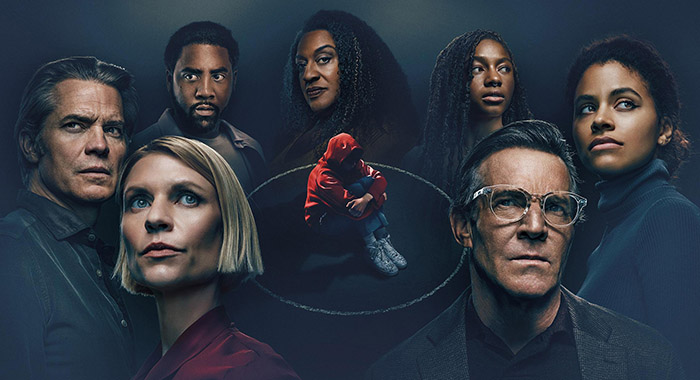
(Photo by Max)
The other “family” is a more liberal definition of the word. It’s a Guyanese crime syndicate headed by CCH Pounder’s lioness Savitri Mahabir. Among her disciples is her nephew, Jharrel Jerome’s power-hungry Aked. He’s put in charge of a mission that includes two new recruits: his fiancée Natalia’s (Adia) brother Louis (Gerald Jones) and his friend Xavier (Sheyi Cole).
That mission? Kidnap Jared, a kid they’ve never met or even heard of until they receive this order.
Things don’t go to plan, especially with Zazie Beetz’s Mel Harmony, an agent with the U.S. Postal Inspection Service, on the case. The central crime overlaps with something she’s covering, and her boss, Manny Broward (Jim Gaffigan), is asking his own questions. Over the six episodes, secrets are exposed, allegiances are made, and moral dilemmas become life-or-death decisions.
“I was viewing this whole thing as a real New York City melodrama,” Soderbergh said. “I liked the sprawling aspect of it and that it started out about this group of well-off white people being victimized and then, over the course of the show, the whole thing starts to … tilt. But by the end of it, we’re in a very different place than where we started. But I liked the sort of bait-and-switch aspect of it.”
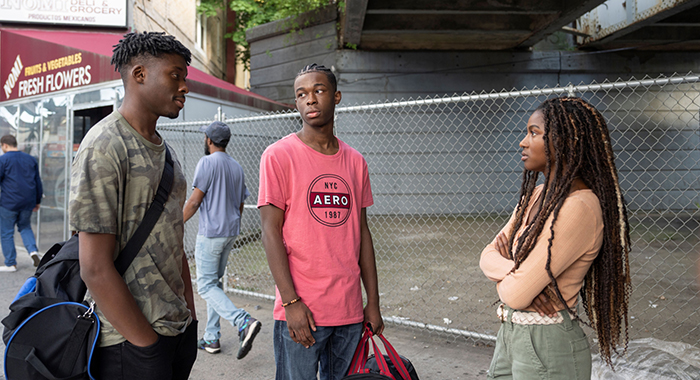
Sheyi Cole as Xavier, Gerald Jones as Louis and Adia as Natalia (Photo by Max)
Soderbergh’s own penchant for reality programming has long amused his fans. And he justified his fascination with the upstairs-downstairs yacht-centric Bravo program Below Deck earlier this year when he told Rolling Stone that this is a show where a ship’s crew members are frequently put in a position of “if you’d literally done nothing, you would be in a better situation than you are now.”
In his mind, Full Circle presents the opposite of that. Soderbergh said there’s even a line in the series where Gaffigan’s Manny sat by Danes’ Sam “on the bench at Washington Square Park and said, ‘If you actually do nothing, this will all go away and go back to normal.'”
“That was an expression of my witnessing people in my life getting themselves into more trouble by making a choice that is demonstrably worse than if they’d literally done nothing,” Soderbergh said of that scene.
The stakes for this show are even higher, Olyphant told Rotten Tomatoes, because it is a program that puts younger people’s lives in danger.
“It’s the heartbeat of the show; all the young people in the show,” Olyphant said. “They are at a point in their lives where they’re about to be full-grown adults and have to make these kinds of decisions in their own lives. They’re still somewhat innocent. But they’re not little, little kids that make some very adult decisions.”
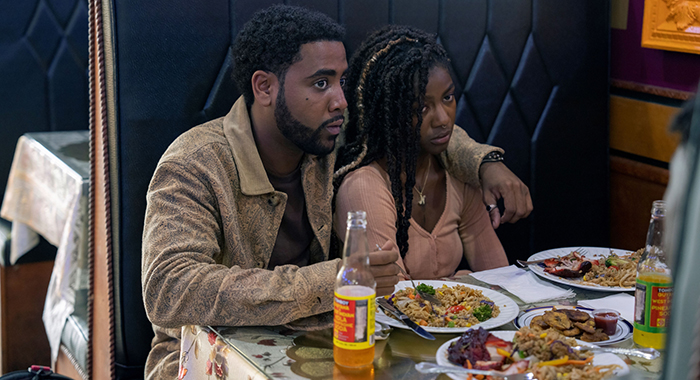
Jharrel Jerome as Aked and Adia as Natalia (Photo by Max)
Soderbergh described the brother and sister Louis and Natalia as “the heroes” of the show because “they’ve found themselves in a bad circumstance, but they’re good people.” These circumstances are best epitomized by Jerome’s character Aked. The actor said he and Adia talked a lot about whether her character was with him because he represented some stability or if she was just afraid to turn down his advances.
“In the script, Aked is a monster,” Jerome said. “In most of his moments, he’s angry. And he’s trying to command and he’s trying to direct even though he has no idea what he’s talking about. So I was trying to find this line of having there be some sort of understanding of who he is … hopefully, by the end of the season, there’s a few layers peeled off of him and you can sort of understand his reasoning. He’s still a villain, and he still definitely made the wrong choices. But, hopefully, you can see that he made the wrong choices and not just bad ones.”
Aked desperately wants to be seen by his aunt, Savitri, but she’s preoccupied with other things. Chief among them is attempting to reverse a hex she swears was put on her family for an atrocity committed years prior. Pounder was born in Guyana, but said she didn’t think that this part was specifically written for her. But she said she was aware of Obeah, or the kind of sorcery practiced in Caribbean cultures, and how a character like this would move about her world.
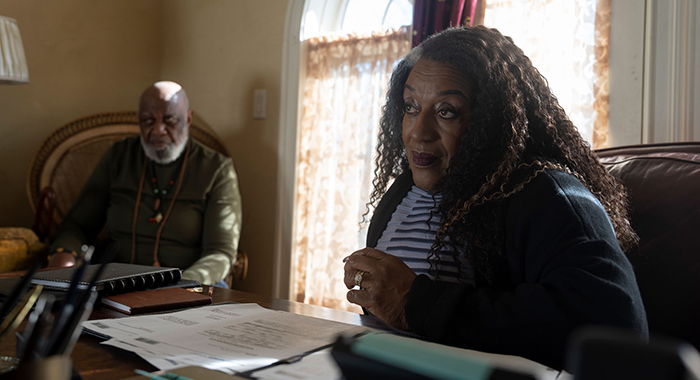
CCH Pounder as as Savitri Mahabir (Photo by Max)
“Everybody says that she’s so evil, but she’s so calm,” Pounder said. She said she did base the character on someone she knew as well as the stern teachers she avoided in the hallways while growing up. But, she said, in general, women in her country “have a kind of iron hand, velvet glove [approach]: very much the woman behind the scenes who can be very controlling, very much in power. She will not raise her voice in a room of men. And yet, she’s the boss. And I’ve seen many bosses like that.”
Not every character on this show is obviously evil. Gaffigan’s Manny and Beetz’s Mel don’t see eye-to-eye on almost anything and it’s a character tell that he “jokes” to another colleague that every time he gets in an argument with a woman he loses.
“I think Manny is much more of a guy who’s done his time who can’t really embrace the responsibility he has,” Gaffigan said. “That statement, as misogynistic as it might sound, is more about his inability to take responsibility. And which is interesting, because that’s also Mel’s problem, too.”
He said that, while Mel feels like Manny is holding her back at work, he is trying to protect her from herself and that “there’s a certain empathy that he has for her.”
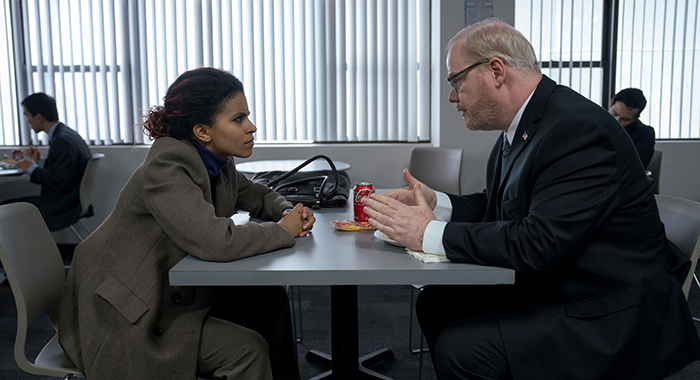
Zazie Beetz as Mel Harmony and Jim Gaffigan as Manny Broward (Photo by Max)
One of the main issues with Mel is that she’s too smart. A lot of the secrets that are divulged at the beginning of the series come out through Beetz’s exposition because her character can see a lot of predictable scenarios coming.
“She’s very smart and ahead of the game in certain ways,” Beetz said. “but I also think that she lacks confidence in certain elements too and … striking that balance, to me, it was important. She is struggling in her romantic relationships and also struggling in her work life, even though she has talent. But she has a hard time, I think, interfacing with people.”
Beetz worked with the hair and makeup team to show this inner struggle in Mel’s appearance. She said she originally wanted the character to have “firecracker red” hair but they eventually toned it down to pink streaks and also styled in a way that looked more buttoned up in the office versus at home. She did, Beetz said, have a “good sock game.”
The actress said that, although it can look like Mel is a ladder climber and that she is “obsessed with her work,” the character also “finds her value in her work. She actually really cares about trying to help people and trying to solve crime.”
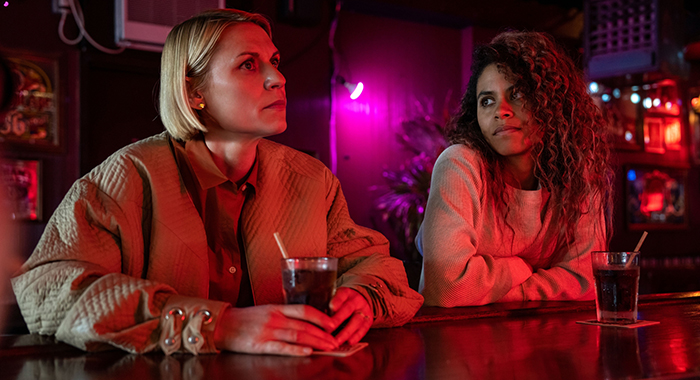
Claire Danes as Sam Browne and Zazie Beetz as Mel Harmony (Photo by Max)
Television, especially melodramas, has a habit of doling out comeuppances that seem to fit the crime. Will Full Circle take the same approach?
“I think the effects will always continue to ripple and once the energy is out, it’s out and you can’t reel it back in,” Beetz said.
Soderbergh compared the series to his 2000 film Traffic, a drug-focused crime drama that was also told from different perspectives. He said even when he was making that film he knew that he could make it again “every five years, because this is never gonna get solved and it’s never gonna go away.”
“We have a tendency to not be able to get out of our own way, or at least, to have an idea and then before that idea actually gets executed, it becomes so compromised that you can’t really get a sense of whether it was a good idea or not,” he continued. “None of the major themes in the either of those projects is going anywhere anytime soon. Especially in New York, I think there’s a version of Full Circle that you could make every year that involves two completely different groups of people up to things that either they shouldn’t be up to or that are built on foundations that they have not acknowledged are corrupt.”
![]() 78%
Full Circle: Limited Series
(2023)
premieres its first two episodes on Thursday, July 13 on Max.
78%
Full Circle: Limited Series
(2023)
premieres its first two episodes on Thursday, July 13 on Max.